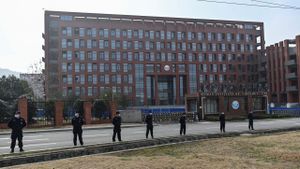Canada has officially responded to the recent imposition of tariffs by the United States with retaliatory measures aimed at U.S. goods, highlighting the growing economic tensions between the neighboring countries. The first round of retaliatory tariffs is set to take effect on February 4, coinciding with the implementation of the U.S. tariffs.
According to the Canadian Department of Finance, the initial tariff list targets various products, including beverages, cosmetics, and paper goods. Prime Minister Justin Trudeau has vowed to protect Canadian interests, indicating the government will also impose tariffs on additional U.S. imports valued at CAD 125 billion (USD 85 billion).
This forthcoming list is expected to cover items such as passenger vehicles, trucks, buses, steel, aluminum, and select agricultural products, alongside meat and dairy goods. A process for tax exemption has been established for Canadian firms adversely affected by these tariffs, as the government considers additional non-tariff measures should Washington continue its economic assault on Canada.
The U.S. tariffs, announced by former President Donald Trump on February 1, consist of 25% duties on nearly all Canadian goods, excluding energy products, which are subjected to a 10% tariff. Canadian officials and citizens alike have expressed outrage and concern following these announcements.
Local reactions have varied, with many Canadians canceling trips south of the border or opting to boycott American products altogether. The sentiment pervasive among Canadians seems to indicate shock at the aggressive posture taken by the U.S., especially since it is so close geographically and culturally.
Drew Dilkens, the Mayor of Windsor, voiced his concerns during an interview, saying, "If he's willing to do this with Canada, what is he willing to do with other countries?" He highlighted the economic strain these tariffs impose, as approximately CAD 400 million (USD 272 million) crosses the Ambassador Bridge connecting Windsor and Detroit daily.
Calgary resident Ken Lima-Coelho noted how the news of tariffs has instilled national pride within his family, with his son even planning to sew a small Canadian flag onto his backpack for an upcoming Europe trip. Lima-Coelho remarked, "I can't do anything about the political deadlock we're stuck with... But I can change the toothpaste I buy..." reflecting the resolve of many citizens to support local businesses over American ones.
Meanwhile, Doug Ford, the Premier of Ontario, has acted decisively by eliminating American-produced alcohol from the shelves of the Liquor Control Board of Ontario (LCBO), which sells nearly CAD 1 billion worth of U.S. alcoholic beverages annually. Ford declared, "Not anymore," indicating strong governmental support behind local businesses and preferences.
Moving beyond economic impacts, some residents demonstrated their displeasure at local sports events, booing the U.S. national anthem before games, underscoring the frustration felt by citizens. Loraine MacKenzie Shepherd expressed hope for unity, stating, "We need to find ways to unite with others suffering from unreasonable anger," emphasizing community resilience.
Canadian public sentiment around the tariffs is mixed but steeped thickly in nationalism and support for local products. Mike Davies, another resident affected by the tariffs, created a Facebook group encouraging boycotts of American goods and shared his decision to avoid the U.S. altogether: "The tariffs are betrayal," he declared, connecting his frustrations not just to policies but to the broader relationship between the nations.
Overall, the new tariffs have provoked widespread public mobilization and debate, with individuals leaning toward localism and collective economic resistance. The question arises—how long will these tensions persist, and will they lead to long-lasting changes between these two countries so deeply intertwined?



